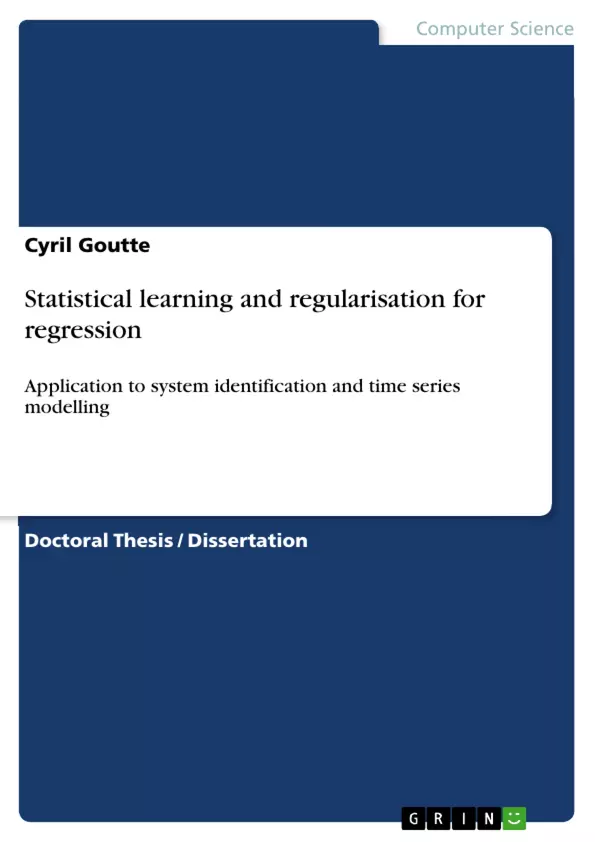
Statistical learning and regularisation for regression
Doktorarbeit / Dissertation, 1997
156 Seiten, Note: n/a
Leseprobe
Inhaltsverzeichnis (Table of Contents)
- Acknowledgements
- Introduction
- Notation
Zielsetzung und Themenschwerpunkte (Objectives and Key Themes)
This doctoral thesis aims to explore statistical learning and regularization techniques for regression problems, with applications in system identification and time series modeling. The research investigates methods to improve the accuracy and robustness of models built from data.
- Statistical learning methods for regression
- Regularization techniques to improve model robustness
- Application to system identification
- Application to time series modeling
- Model parameter estimation
Zusammenfassung der Kapitel (Chapter Summaries)
Acknowledgements: This chapter expresses gratitude to various individuals and institutions for their support and contributions throughout the author's doctoral research. Specific thanks are extended to the thesis advisor, Professor Patrick Gallinari, for his guidance and support, as well as to Professor Lars Kai Hansen for his mentorship during a research stay in Denmark. The author also acknowledges the contributions of the jury members and other colleagues who provided helpful discussions and feedback. Finally, a personal acknowledgment is made to the author's wife for her unwavering support.
Introduction: This introductory chapter sets the stage for the thesis by providing an overview of the problem of regression and its applications in system identification and time series modeling. It introduces the concept of statistical learning and regularization, outlining the challenges and opportunities within this field. It establishes the context for the research presented in the following chapters and provides a brief roadmap for the thesis structure. The importance of accurate and robust model building is emphasized, highlighting the motivation behind the work presented.
Notation: This section defines the mathematical notation used throughout the thesis. It lists key symbols and their meanings, including those related to system input and output, model parameters, error estimation, and probability distributions. This ensures consistency and clarity in the mathematical formulations presented in subsequent chapters. The careful definition of notation is crucial for the rigorous treatment of the mathematical concepts involved in the research.
Schlüsselwörter (Keywords)
Statistical learning, regularization, regression, system identification, time series modeling, parameter estimation, model robustness, data analysis.
Häufig gestellte Fragen
What is the purpose of this document?
This document is a language preview of a doctoral thesis focusing on statistical learning and regularization techniques for regression problems, with applications in system identification and time series modeling. It includes the table of contents, objectives, key themes, chapter summaries, and keywords.
What are the main topics covered in this thesis?
The main topics covered include statistical learning methods for regression, regularization techniques to improve model robustness, application to system identification, application to time series modeling, and model parameter estimation.
What does the "Acknowledgements" chapter contain?
The "Acknowledgements" chapter expresses gratitude to individuals and institutions for their support during the author's doctoral research. It specifically thanks the thesis advisor, Professor Patrick Gallinari, Professor Lars Kai Hansen, jury members, colleagues, and the author's wife.
What does the "Introduction" chapter cover?
The "Introduction" chapter provides an overview of regression and its applications in system identification and time series modeling. It introduces statistical learning and regularization, outlining challenges and opportunities in the field. It also establishes the context for the research and provides a roadmap for the thesis structure.
What is the purpose of the "Notation" section?
The "Notation" section defines the mathematical notation used throughout the thesis, including key symbols and their meanings related to system input and output, model parameters, error estimation, and probability distributions.
What are the keywords associated with this thesis?
The keywords associated with this thesis are: Statistical learning, regularization, regression, system identification, time series modeling, parameter estimation, model robustness, and data analysis.
What type of research is presented in this document?
The document outlines research related to statistical learning, regularization techniques, and their application to regression problems, particularly in the contexts of system identification and time series modeling. The goal is to improve the accuracy and robustness of models built from data.
Details
- Titel
- Statistical learning and regularisation for regression
- Untertitel
- Application to system identification and time series modelling
- Note
- n/a
- Autor
- Cyril Goutte (Autor:in)
- Erscheinungsjahr
- 1997
- Seiten
- 156
- Katalognummer
- V358916
- ISBN (eBook)
- 9783668443198
- ISBN (Buch)
- 9783668443204
- Dateigröße
- 1449 KB
- Sprache
- Englisch
- Schlagworte
- statistical application
- Produktsicherheit
- GRIN Publishing GmbH
- Preis (Ebook)
- US$ 0,99
- Preis (Book)
- US$ 56,99
- Arbeit zitieren
- Cyril Goutte (Autor:in), 1997, Statistical learning and regularisation for regression, München, Page::Imprint:: GRINVerlagOHG, https://www.diplomarbeiten24.de/document/358916
- Autor werden
- Ihre Optionen
- Vertriebskanäle
- Premium Services
- Autorenprofil
- Textarten und Formate
- Services für Verlage, Hochschulen, Unternehmen

- © GRIN Publishing GmbH.
- Alle Inhalte urheberrechtlich geschützt. Kopieren und verbreiten untersagt.
- info@grin.com
- AGB
- Open Publishing
Der GRIN Verlag hat sich seit 1998 auf die Veröffentlichung akademischer eBooks und Bücher spezialisiert. Der GRIN Verlag steht damit als erstes Unternehmen für User Generated Quality Content. Die Verlagsseiten GRIN.com, Hausarbeiten.de und Diplomarbeiten24 bieten für Hochschullehrer, Absolventen und Studenten die ideale Plattform, wissenschaftliche Texte wie Hausarbeiten, Referate, Bachelorarbeiten, Masterarbeiten, Diplomarbeiten, Dissertationen und wissenschaftliche Aufsätze einem breiten Publikum zu präsentieren.
Kostenfreie Veröffentlichung: Hausarbeit, Bachelorarbeit, Diplomarbeit, Dissertation, Masterarbeit, Interpretation oder Referat jetzt veröffentlichen!
- GRIN Verlag GmbH
-
- Nymphenburger Str. 86
- 80636
- Munich, Deutschland
- +49 89-550559-0
- +49 89-550559-10
- info@grin.com
-









